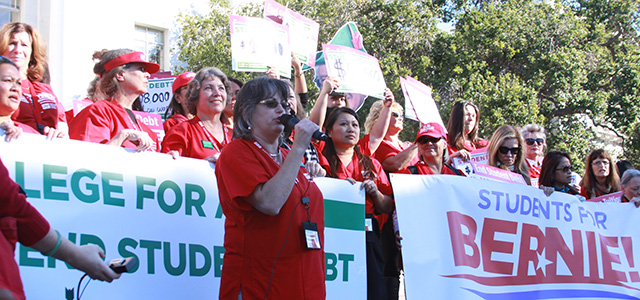News
Nurses, students can help each other solve education funding problems

Yesterday, hundreds of registered nurses from around California joined the UC Berkeley student walkout as part of the #millionstudentmarch national day of action. There were walkouts, teach-ins and rallies held at more than 100 college campuses including at UC Davis, UC Santa Cruz, UC Riverside, UC Irvine and UC San Diego.
The national day of action focused on three key demands: tuition-free public education, cancellation of all student debt and $15 per hour campuswide minimum wage at every college in the country.
Nurses joined this walkout because we know that student debt is harming our patients and our communities. Coupled with low wages, this debt forces too many people to make choices no one should have to make: Should I buy groceries for my children or buy medicine? Should I get the test the doctor ordered or pay my loan payment on time and avoid a late fee?
But that’s not all — student debt also harms nurses and their families directly. Take me, for example.
In a few months, I will have finally paid off the very last of my $20,000 worth of student loans for the private nursing school I graduated from in 1995. I’ve been paying off these loans for 20 years and am now 52 years old.
But instead of finally focusing on building up my family’s savings and working toward my husband’s and my retirement, we are now facing many thousands of dollars in student loans over the next eight years to put our two sons through college.
I make a good living as a unionized registered nurse in the San Francisco Bay Area. My husband also works. We don’t worry about where our next meal is coming from or keeping a roof over our heads, but we don’t live extravagant lifestyles. Most of our vacations consist of going to Michigan to visit my mother.
Yet when our eldest son was accepted into UC Santa Cruz last year, the financial aid office told us that we were responsible for $28,000 out of pocket of his $33,000 annual tuition and living expenses. The only aid was a loan of $5,000 to make up the difference.
Do you have $28,000 lying around? We don’t. So we did what so many families in our area are doing. We took out a second mortgage on our home. At a time when all the personal finance experts say we should be minimizing debt, we are burying ourselves in more of it. I don’t know how we will repay this debt. Nursing is extremely hard on your body; I now constantly worry that I am one work injury or layoff away from financial ruin. And goodbye, retirement!
Sadly, this second mortgage is not even enough to cover four years of college. We will have to figure out a way to pay some of it off soon in order to keep writing those $10,000 tuition checks. And our youngest son will be due to enter college just as soon as our eldest graduates.
Of course, we understand that we are one of the fortunate parents who even own a house to further mortgage and who can financially support our sons’ college studies. Many talented, deserving young people are forgoing college altogether. The rest — millions of students from working-class families — are taking on enormous amounts of school debt that they may very well be saddled with for the rest of their lives. According to government statistics, more than 40 million Americans owe more than $1.3 trillion in student debt, at an average balance of $24,803 as of 2012. Some students owe hundreds of thousands of dollars in loans. Defaults are on the rise, and many expect student loan debt to be the next bubble that bursts and implodes our economy.
It doesn’t have to be this way. If you’ve ever spoken to an exchange student from many countries in Europe, especially the Scandinavian ones, you’ll learn that college or university there is free or practically free. Students there can pursue studies they’re actually interested in and build their adult lives after graduation without worrying about “servicing” their loans. These governments understand that free postsecondary education is an investment in their people and in their countries.
The solution is simple. It’s time for Wall Street to pay its fair share of taxes, in the form of a tiny financial transaction tax (aka Robin Hood Tax) so that all students can attend public colleges and universities for free. That’s what a new bill called the College for All Act introduced by Sen. Bernie Sanders in May proposes.
I am in full support of the College for All Act. It may not happen in time for our eldest son, but I have my hopes up for our youngest.
Imagine going to college and studying what you actually want, versus what you think will make you the most money once you graduate. Imagine getting to actually focus on your schoolwork, network with classmates and attend your professors’ office hours instead of rushing from part-time job to part-time job. Imagine graduating free and clear from any debt and without the pressure to take the first job that comes along because your loan payments are going to kick in.
As nurses, we know that the health of our communities depends on making free public college education a reality. That’s why we joined the UC Berkeley student walk-out this week and will continue to work with students to accomplish this worthwhile goal. Together, we can make this happen!
Katy Roemer is an registered nurse at Kaiser Oakland, a Cal alumna, and a board member of the California Nurses Association.